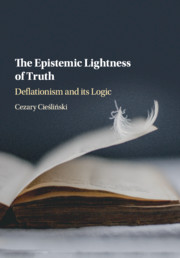Book contents
- Frontmatter
- Contents
- Acknowledgements
- Introduction
- 1 Preliminaries
- 2 Approaches to Truth
- Part I Disquotation
- Part II Conservativity
- 6 (Non)Conservativity of Disquotation
- 7 CT− and CT: Conservativity Properties
- 8 Other Compositional Truth Theories
- 9 Conservativity: Philosophical Motivations
- 10 Maximal Conservative Theories
- 11 The Conservativeness Argument
- Part III Reflection Principles
- Afterword
- Glossary of Symbols
- Bibliography
- Index
9 - Conservativity: Philosophical Motivations
from Part II - Conservativity
Published online by Cambridge University Press: 30 November 2017
- Frontmatter
- Contents
- Acknowledgements
- Introduction
- 1 Preliminaries
- 2 Approaches to Truth
- Part I Disquotation
- Part II Conservativity
- 6 (Non)Conservativity of Disquotation
- 7 CT− and CT: Conservativity Properties
- 8 Other Compositional Truth Theories
- 9 Conservativity: Philosophical Motivations
- 10 Maximal Conservative Theories
- 11 The Conservativeness Argument
- Part III Reflection Principles
- Afterword
- Glossary of Symbols
- Bibliography
- Index
Summary
Semantic Conservativity
The presentation of the formal framework has been completed, and I turn now to a discussion of philosophical motivation for conservativity demands. In this section the conservativity requirement in its semantic version will be considered.
Model-theoretic conservativity is a relatively recent candidate for the role of the property which would be able to give meaning to the slogans of thinness of truth. To my knowledge, very few authors have tried to provide careful philosophical argumentation supporting semantically conservative truth theories as somehow ‘proper’ or ‘adequate’ for the adherents of the innocence claim. It is my aim now to consider such arguments. Why should semantic conservativity be a virtue?
Indeed, some authors have tried to portray semantic conservativity as a consequence of the traditional deflationist claims. Thus, in a recent paper, Andrea Strollo states quite explicitly that semantic non-conservativity contradicts the tenets of deflationism. If our theory of truth were to exclude some models, then “in open contrast with the deflationist claim, the property of truth would enter reality as a robust ingredient” (Strollo 2013, p. 530).
In itself, this amounts to little more than ascribing one's intuitions to the deflationist without stating any clear reason for doing so. When no citations are given and no attempt is made to relate the semantic conservativity doctrine to explicitly formulated deflationary tenets, one is fully entitled to conclude that no link whatsoever has been established with what the deflationists have actually been saying. We could, of course, decide to define ‘robust’ in such a way that semantically non-conservative truth will emerge as robust. However, the question should be asked whether the ‘open contrast with the deflationist claim’ is real or illusory. Why should it matter to the deflationist whether his theory excludes some models?
Strollo himself does not answer this question in his paper; he remarks only that “good reasons had been put forward” for the conservativeness demand, referring the reader to (Shapiro 1998). Shapiro's argumentation will be discussed in the next section. However, let us just note that in the specific context of discussing the semantic conservativity demand, referring the reader to Shapiro's paper is hardly satisfactory.
- Type
- Chapter
- Information
- The Epistemic Lightness of TruthDeflationism and its Logic, pp. 145 - 173Publisher: Cambridge University PressPrint publication year: 2017



